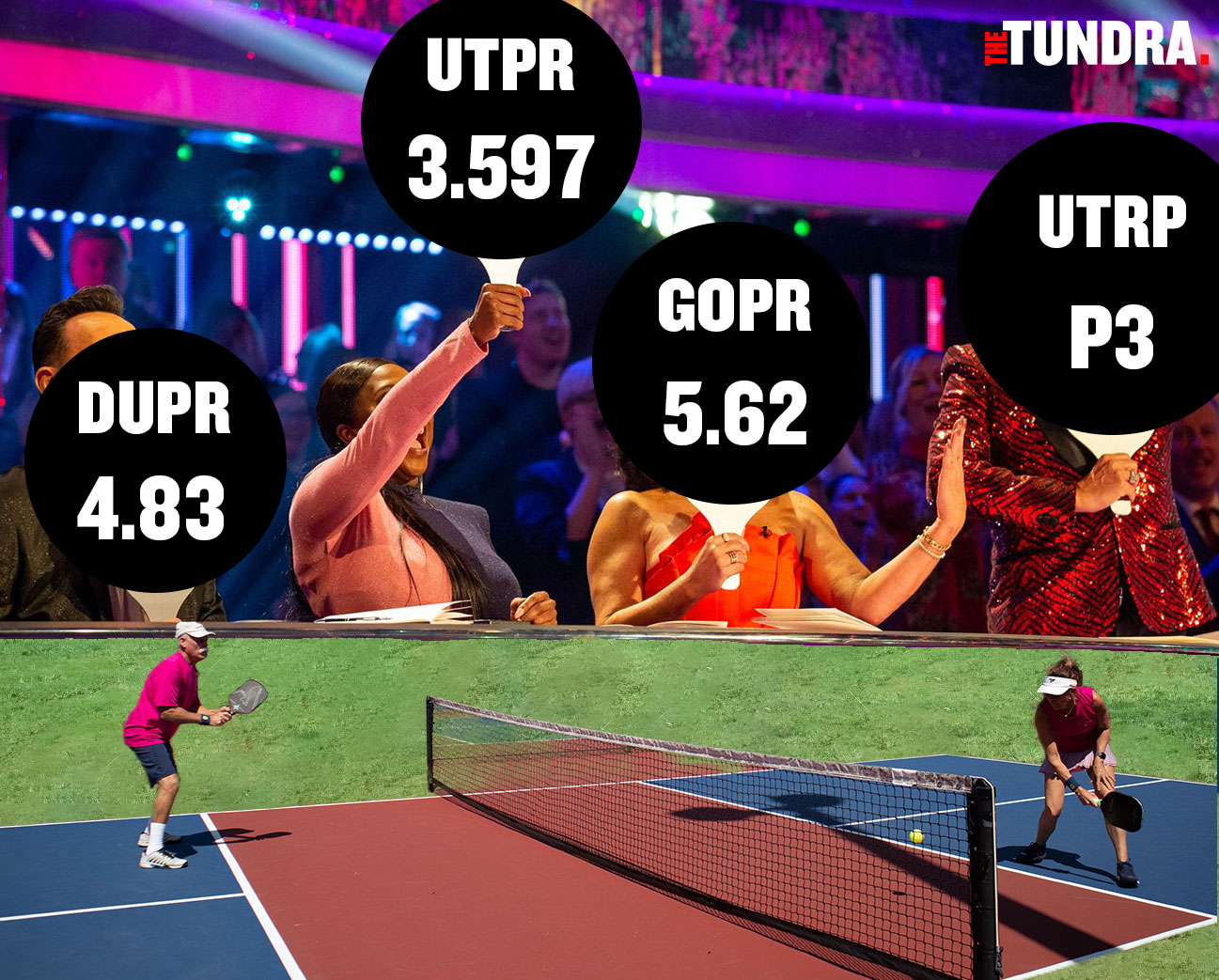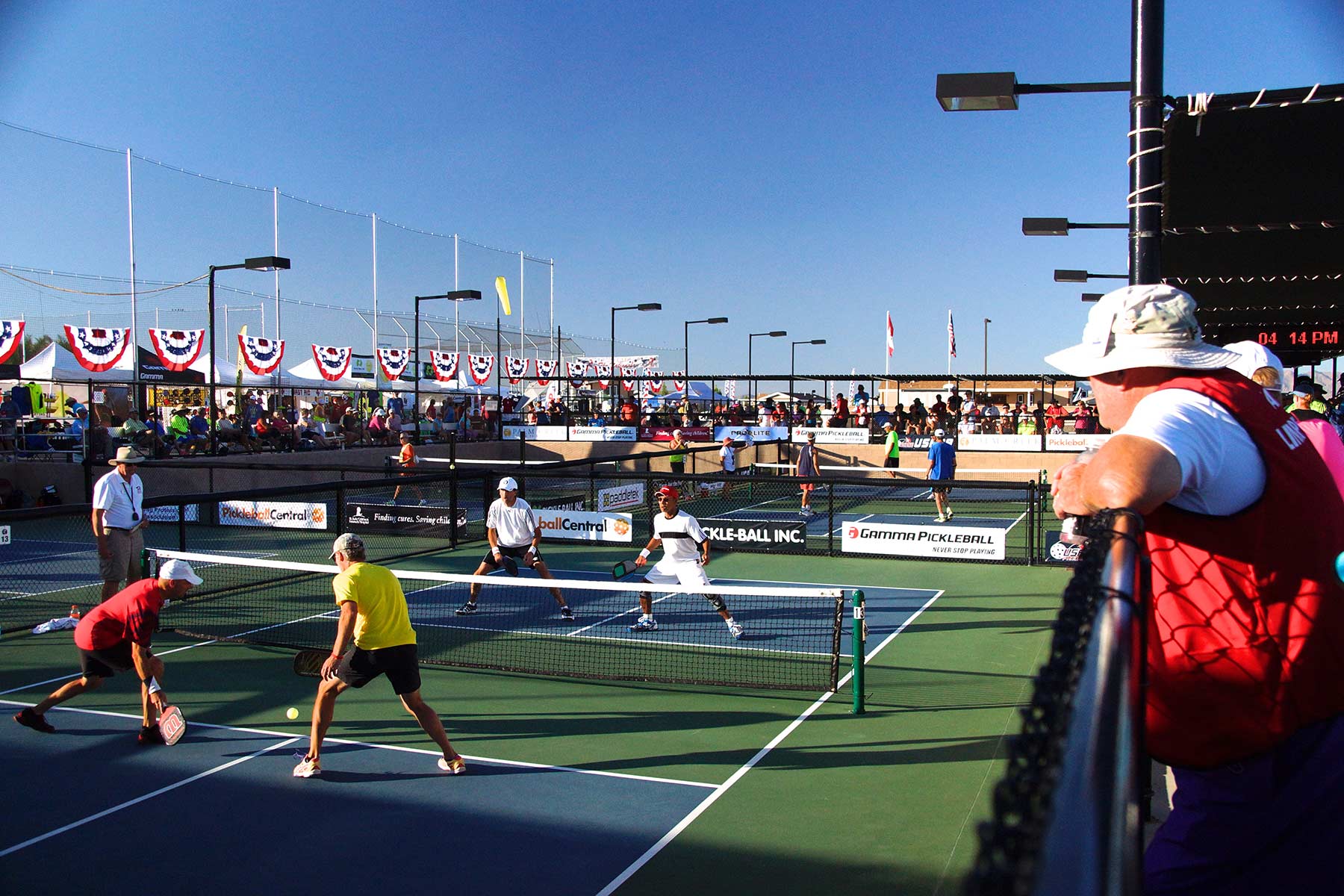Pickleball Ratings: Everything But The Kitchen Dink
A breakdown of the pickleball ratings systems

What exactly are pickleball ratings? How do you get a pickleball rating? And why are there so many of them?
So, you've taken up pickleball just like everyone else on your block. You've been playing as much as you can, and your paddle skills have really developed. Now you want to make yourself official, and the best way to do that is to enter a tournament, right?. No problem! Just dish out your DUPR ratings or UTPR or GOPR or UTRP and you're all set to register for whichever tournament you like.
"Wait, what?" you may be asking yourself. "DUPR ratings? UTPR? GOPR? UTRP? What is all this nonsense?"
Welcome to the confusing world of the pickleball ratings system, where you'll enter with the confident swagger of a big leaguer smashing a volley, emotionally scarring their opponent, and leave like a dog with its tail tucked between its legs, completely devoid of any self-worth.
All these different ratings systems can leave the average pickleballer fretted and confused, but worry not! We've got you covered, so read on to alleviate your ailments.
First, let's go over what a pickleball rating is.
What are pickleball ratings and how are they calculated?

A pickleball rating is a measure of a player's skill level and performance in the sport. They are commonly used to categorize players into skill levels, allowing for fair and competitive matches. These ratings help organizers and players better understand their own abilities and find suitable opponents for matches.
Pickleball ratings are typically generated through a combination of player performance data and a rating algorithm. The specific process and algorithm can vary depending on the organization or platform that manages the pickleball ratings. Here's a general overview of how pickleball ratings are often generated:
Player Performance Data
To create accurate ratings, data about players' performances in pickleball matches is collected and recorded. This data may include match results, scores, opponents' ratings, and possibly other relevant statistics.
Rating Algorithm
A rating algorithm is a mathematical formula used to calculate a player's rating based on their performance data. There are several rating algorithms commonly used in sports, such as Elo, Glicko, and TrueSkill. These algorithms take into account factors like match outcomes, opponents' ratings, and the number of matches played to estimate a player's skill level.
Initial Rating
Every player typically starts with an initial rating when they first join the rating system. This rating is often set at an average level and is then adjusted as the player participates in more matches and their skill level becomes clearer.
Rating Updates
As players participate in more matches, their ratings are regularly updated based on their performance against opponents with different ratings. A player's rating may increase when they win matches against higher-rated opponents or decrease if they lose to lower-rated opponents.
Rating Stability
To avoid rapid fluctuations in ratings, most rating algorithms incorporate a concept of rating stability. This means that the more matches a player has played, the less each new match result will impact their rating, especially if they have already established a stable rating.
Rating Categories
Depending on the rating system, players may be categorized into different skill levels or rating brackets (e.g., beginner, intermediate, advanced) based on their numerical ratings. This helps ensure players are matched against opponents of similar skill levels.
Periodic Recalibration
Over time, rating systems may undergo recalibration to ensure they accurately reflect the evolving skill levels of the players in the community. This recalibration may involve adjusting the initial ratings, modifying the rating algorithm, or implementing other improvements.
Get Ready To Be Confused
Now, forget about everything we just told you, because every ratings system is different. Just kidding, sort of. While every ratings system is a little different, they all serve a unified purpose: to help players better understand themselves and their opponents.
Dynamic Universal Pickleball Rating (DUPR)

One of the best known rating systems is the DUPR ratings, which was developed in 2021 by Steve Kuhn, founder of Major League Pickleball (MLP). DUPR ratings are self-proclaimed to be "the most accurate global rating system trusted by the world’s premier Pickleball clubs, tours, and professionals," as their official website states. With DUPR ratings, all players regardless of their age, gender, location, or skill are rated on the same scale between 2.00-8.00.
DUPR pickleball is free to everyone, and anyone can obtain their own rating. Just a single match result is sufficient to receive a DUPR rating, while a set of four to five match results will lead to an even more precise and reliable DUPR ratings.
Your DUPR is calculated using the following three factors:
-
Margin of victory: This refers to the difference in points between you and your opponent
-
Type of result: Is your score the result of recreational play, club play, league play, or a sanctioned tournament? Tournament, club, and league matches are weighted more heavily than self-posted scores.
-
Outcome: Did you win or lose?
DUPR ratings claim to be statistically the most accurate pickleball rating system in the world and the only universal system, meaning that all players regardless of their age, gender or skill are on the same scale. It's also the only system that takes into account all of a player's match results, regardless of event type, location, or software provider. Any match with the minimum number of points needed will count toward your rating.
The DUPR ratings system is the official rating system of MLP (naturally) as well as the Professional Pickleball Association (PPA), so it's been embraced by the pickleball community all over the world.
USA Pickleball Tournament Player Rating (UTPR)

USA Pickleball, which is the official governing body of pickleball in the United States, has created its own player rating system to help tournament directors and players improve their experience.
A player's UTPR is a calculated player rating based exclusively on a player's tournament win/loss match results in comparison to the relative strength of their opponents. The UTPR is referred to as "dynamic" because it uses both a four-digit rating system (e.g. 3.597) and a two-digit system, like the DUPR uses. Don't worry, we're just as confused, since the DUPR is literally called "Dynamic," but in this case, we're specifically referring to the number of digits used. While the player's rounded down two-digit value is used to establish eligibility for a tournament bracket, the four-digit value is utilized for seeding within a bracket. The four-digit UTPR system also helps players who are "on the bubble" and very closely rated to each other. It makes it easier for them to more accurately find compatible partners.
Players may have separate UTPRs for singles, doubles, and mixed doubles, depending on which type of event(s) they participate in. To achieve a UTPR, you need to participate in at least one tournament that uses PickleballTournaments.com software (this is software that is the exclusive official provider of USA Pickleball Tournament Ratings).
One important thing to note is the UTPR only incorporates USA Pickleball-sanctioned tournament results, so your UTPR rating is specific only to said tournaments. Taking part in a pickleball tournament that is not sanctioned by USA Pickleball does not affect your UTPR. Also, since the UTPR system is based exclusively on win/loss results, the number of medals won by an individual does not have a direct consequence on the ratings calculation. As such, UTPRs are designed to be self-correcting, adjusting with your changing and growing skill set as you play more matches and play more frequently.
Global Official Pickleball Rating (GOPR)

The GOPR is affiliated with the Xtreme Pickleball League (XPL) whose tournaments are GOPR-sanctioned. GOPR proclaims itself to be “Pickleball’s most accurate rating system.” Much like the DUPR, it's a two-digit rating system and players are rated on a scale between 2.00-8.00. The GOPR is also based on the following factors:
-
Type of game: Is it a self-posted recreational game score, a league/ladder match, or a tournament result?
-
Outcome: Did you win or lose?
-
Points won: How many points did you score?
-
Points lost: How many points were scored against you?
-
Reliability factor: Your GOPR becomes more reliable based on your connectivity to other players in the GOPR system.
-
Your most recent matches: You need three results in the last 90 days, six results in the last 180 days, or 12 results in the last 270 days in order for your rating to be reliable. In other words, the number of results needed to be fully reliable doubles every 90 days (note: DUPR also takes into account this "half life" principle of exponential decay).
To initiate the tracking of your GOPR, follow these steps:
-
Sign up for free at myGOPR.com to create your account.
-
Start playing games once you've registered. If you compete against another GOPR member and either person/team achieves at least six points, you can enter the score to initiate your rating.
Remember, all players must be registered with GOPR for match results to impact ratings on their platform, ensuring the credibility and accuracy of GOPR ratings.
For more precise GOPR ratings, they recommend playing against a diverse range of players. By engaging with a greater number of GOPR participants, your rating becomes more accurate, thanks to enhanced connectivity within the system.
An important note to consider is your rating can actually go down sometimes even though you might win. Every match you play is subject to the algorithm's expected result, which determines your GOPR performance. If, for instance, the algorithm anticipates you to win with a score of 11-6 but you end up winning 11-9, your GOPR might decrease due to the deviation.
However, the GOPR system takes into account the performances of all players involved in the match. For instance, if the opponent you defeated 11-9 consistently performs exceptionally well in their subsequent matches, frequently surpassing the expected results, their GOPR will rise. Meanwhile, your GOPR may not be as significantly affected, acknowledging that your opponent is showing noticeable improvement, which the algorithm duly recognizes.
Furthermore, it's important to note that your GOPR is not static even if you stop playing. If you surpass the expected result of the algorithm while playing against a certain opponent, and that opponent continues to exceed the algorithm's expectations in their future matches, you will still reap the benefits from their improved performance, even if you have discontinued your own participation. GOPR remains dynamic and can be influenced by the ongoing achievements of other players.
Universal Tennis Pickleball Rating (UTRP)

Universal Tennis is the official and exclusive pickleball rating and technology partner of the Association of Pickleball Players (APP).
In March of 2023, Universal Tennis announced they will be carrying over the success of its tennis rating system into pickleball. This new rating system is called the UTR Pickleball Rating, or UTRP for short (not to be confused with USA Pickleball’s UTPR).
This new UTRP system will rate players as either P1 (beginner), P2 (intermediate), P3 (advanced), or P4 (expert/pro).
Since it’s so new, a numerical rating is still in development for future release.
Why are there so many different pickleball rating systems?
Great question, young apprentice! While the answer to that question is rather elusive, one thing is clear: a unified, consistent system is needed in order for the sport to really grow. "We are not going to develop the sport if we don't change things up," says Hannah Johns, spokesperson for the PPA.
This ratings system melee has been a point of contention among the greater pickleball community. USA Pickleball has actually started something they call the USA Pickleball Ratings Improvement Project, a seven-person task force aiming to provide recommendations for a better way to fairly assess all players' abilities.
Conclusion

While navigating the intricate landscape of pickleball ratings can be a bewildering journey, these ratings serve as vital tools to categorize players by skill level, ensuring fair and engaging matches. With a variety of systems like DUPR, UTPR, GOPR, and UTRP, each having its own intricacies, players often find themselves grappling with confusion and uncertainty.
Regardless of whichever ratings system you use, the point is to just get out there and play.

